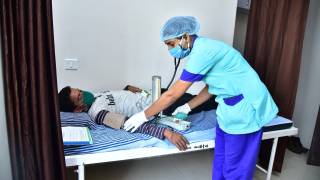Newborns Included in Monoclonal Antibody COVID-19 Treatment

The U.S. Food and Drug Administration (FDA) announced it revised the existing emergency use authorization (EUA) of bamlanivimab and etesevimab to additionally authorize the treatment of mild to moderate COVID-19 in all younger pediatric patients, including newborns.
The revised EUA was issued to Indiana-based Eli Lilly Co. on December 3, 2021, and includes those who have a positive COVID-19 test and are at high risk for progression to severe COVID-19, including hospitalization or death.
This revision also authorizes bamlanivimab and etesevimab to be administered together for post-exposure prophylaxis to prevent COVID-19 in all pediatric patients, including newborns, at high risk of progression to severe COVID-19, including hospitalization or death.
In February 2021, the FDA originally authorized bamlanivimab and etesevimab administered together to treat mild-to-moderate COVID-19 in adults and pediatric patients (12 years of age or older weighing at least 40 kg).
And on September 16, 2021, the FDA authorized its use for the post-exposure prevention of COVID-19 in certain adults and pediatric individuals (12 years of age and older weighing at least 40 kg) who are at high-risk for progression to severe COVID-19, including hospitalization or death.
In support of the FDA's new action, bamlanivimab and etesevimab administered together were studied in a clinical trial of 125 pediatric patients (14 received placebo), all with at least one risk factor for severe COVID-19, to evaluate the safety and pharmacokinetics of treatment in pediatric patients.
Patients weighing less than 88 pounds received doses of bamlanivimab and etesevimab adjusted for their body weight to achieve comparable exposures to adults and adolescents receiving the authorized dose.
Given the similar course of COVID-19 disease, the authorization of bamlanivimab and etesevimab in younger pediatric patients, including neonates, is supported by safety and efficacy data in adolescents and adults, together with additional pharmacokinetic and safety data from the clinical trial in pediatric patients.
"Now all patients at high risk of severe COVID-19, including children and newborn babies, have an option for treatment and post-exposure prevention. Children under one year of age who are exposed to the virus that causes COVID-19 may be at particularly high risk for severe COVID-19, and this authorization addresses the medical needs of this vulnerable population," said Patrizia Cavazzoni, M.D., director of the FDA's Center for Drug Evaluation and Research, in a press release.
"While today's authorization includes post-exposure prevention of COVID-19 in children, this therapeutic option is not a substitute for vaccination."
"Vaccines remain our best tool in the fight against the virus, and there is a COVID-19 vaccine authorized for children five years of age and above," added Dr. Cavazzoni.
Monoclonal antibodies are laboratory-made proteins that mimic the immune system's ability to fight off harmful pathogens, such as viruses.
Bamlanivimab and etesevimab are monoclonal antibodies directed explicitly against the spike protein of the SARS-CoV-2 virus, designed to block the virus' attachment and entry into human cells.
Bamlanivimab and etesevimab bind to different but overlapping sites on the spike protein of the virus.
Serious adverse events, including hypersensitivity, anaphylaxis, and infusion-related reactions, have been observed with bamlanivimab with and without coadministration of etesevimab.
Possible side effects of bamlanivimab and etesevimab administered together include nausea, dizziness, pruritus, and rash.
Furthermore, the FDA confirmed it is working with sponsors of all currently authorized therapeutics to assess the activity against any SARS-CoV-2 coronavirus variant(s) of interest, such as Omicron, and is committed to communicating with the public as we learn more.
The FDA has authorized other anti-SARS-CoV-2 antibody treatments listed on this U.S. NIH web page.
Our Trust Standards: Medical Advisory Committee























